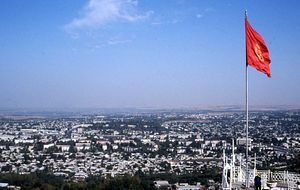Umar Farooq, a U.S. citizen and freelance journalist, was detained in Osh, Kyrgyzstan on March 25. Three days later he was released, stating on Twitter that the charges against him had been dropped and he was leaving the country.
Farooq was in Osh meeting with the local chapter of Bir Duino, a human rights organization to “collect information about Osh residents accused of religious extremism.” On Twitter, Farooq commented that he’d been detained for “journalism” and that the authorities tried to crack the encryption protecting the information he kept on his laptop.
According to Human Rights Watch, the State Committee on National Security (GKNB)’s press service issued a statement on March 27, saying that officers had found “copies of investigation documents of criminal cases recently brought against a leader of the religious-extremist-organization ‘Hizb ut-Tahrir’ and other members of terrorist groups, as well as DVD-discs with video materials of a religious-extremist and terrorist nature, with calls to ‘jihad’ and interreligious discord” in Farooq’s possession.
Religious extremism is a hot topic throughout Central Asia these days, as the region’s leaders capitalize on fears of Islamic extremism sparked by the rise of ISIS in Syria. Although exact numbers are nearly impossible to identify, the region’s leaders claim that hundreds have left to join ISIS and that their return poses a very real threat. This line of thought is backed by organizations like the International Crisis Group which released a report in January titled “Syria Calling: Radicalisation in Central Asia.” The report stated that “growing radicalism will eventually pose a serious threat” to the region.
Many Central Asia experts are skeptical about such claims of widespread radicalization. Casey Michel, writing for The Diplomat, commented recently that the threat posed to Central Asia by ISIS is significantly overblown.
Bir Duino’s offices in Osh were searched on March 27 by officers from the local GKNB branch. According to information received by the International Federation for Human Rights, the officers had a court decision justifying the search under an article of the penal code which provides for “countering extremism activity by confiscating forbidden material of religious character.”
In addition to detaining Farooq and seizing computers and other materials from the offices of Bir Duino, security officials also searched the homes of two lawyers associated with the organization, Valerian Vakhitov and Khusanbay Saliev. Vakhitov and Saliev had been working with Bir Duino on cases relating to violations of human rights during the unrest in Osh in the summer of 2010.The lawyers have reportedly filed a complaint with the Office of the Prosecutor General. Additionally, the Kyrgyzstan Bar Association issued an open letter calling for action against the GKNB officers who, they say, violated the “guarantees of the independence of the legal profession and integrity of lawyers” provided for in the Kyrgyz constitution.
Kyrgyz President Almazbek Atambayev is finishing up a 10-day European tour. Last week, he asked European leaders for military assistance, specifically to counter ISIS in the Fergana Valley.
“I would like to remind you: IS has announced that one of the provinces of the Islamic caliphate should be created in Central Asia, specifically in the Ferghana Valley,” he said at a March 23 press conference in Vienna, Austria.
Mihra Rittmann, Central Asia researcher at Human Rights Watch, commented in the group’s press release that “President Atambayev may have grounds to ask for military assistance to fight legitimate extremist threats…But that should be no excuse for harassing well-known human rights lawyers and interfering with attorney-client privilege.”































